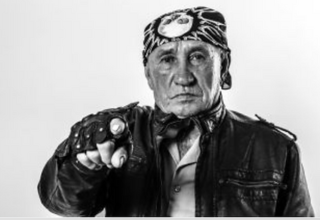Fear
Nothing Says "Old Dude" Like Getting a Motorcycle
Why is the average American motorcyclist a middle-aged man?
Posted July 8, 2015 Reviewed by Devon Frye

Summer is upon us once again, the windows of my house are open, and I am spending more time sitting on my front porch. One of the annual rites of passage associated with this mostly welcome reconnection with the out-of-doors is re-acclimating myself to the sound of motorcycles thundering up and down the streets of my small city.
There must have been a time when motorcycles conjured up all of the usual associations for me: the romance of the open road, freedom, rebelliousness, coolness, manliness, adventure, and sexiness. In fact, I rode bikes a bit when I was young because my brother owned one, as did several of my grad school friends.
Now, I just find them to be really irritating. I must be getting old.
I put my fingers in my ears and curse the idiots who are disturbing the peace as I fantasize about exactly how I will bushwhack the next one who dares to come down my street. This all got me to wondering who these people are.
Quick, focus your mind’s eye and tell me what pops into your head as you think about the images you have of motorcycle riders from the movies. I’ll bet you see sexy, tough, no-nonsense guys like we all want to be but only me and a few other guys actually are. Steve McQueen jumping the fence as he runs from the Nazis in The Great Escape; Marlon Brando winning over the girl in The Wild One; Peter O’Toole speeding to his death in Lawrence of Arabia; Sly Stallone and Henry Winkler being so cool in Lords of the Flatbush, and everyone being so cool in Easy Rider. The list could go on from there.
Now, poke out your mind’s eye as you contemplate the reality. Have you actually looked at these guys? And I do mean guys because almost all of them are men. Old men. Old fat men. Old fat white men. Old fat bald white men with pony tails flapping in the breeze like plastic grocery bags in a dead tree. I am not the first one to notice this, of course. Bill Saporito, in an article in Time Magazine in June of 2014, wrote, “It’s bike night at the Harley-Davidson Museum near downtown Milwaukee... bike night in Milwaukee sure looks like Old White Guy’s Night.”
People used to avoid biker bars out of fear of being beaten to death by hot-tempered young toughs; they now avoid them out of fear of being bored to death by long-winded old geezers.
What is it with old dudes and motorcycles? Is it a last defiant statement that the real man hiding inside looks more like Steve McQueen in The Great Escape than Kevin James in Paul Blart: Mall Cop? Or is it the simple joy of having something powerful throbbing between your legs once again?
Undoubtedly, many middle-aged men will respond that it was not until later in life that they accumulated enough disposable income to be able to afford a motorcycle. Fair enough. But the interesting question is why, after years of struggle to reach a certain level of financial stability, does one choose to spend money on a motorcycle rather than on something else?
It is a marketing truism that people buy products to prop up self-images that are something of a stretch, and that we use consumer goods to project to the world the kind of person we want to believe we are. This is as true for motorcycles as for anything else, and marketers are well aware of this. A 2010 market study by J. D. Power & Associates discovered that the average motorcyclist in the United States is a man who is about 50 years old, and Forbes Magazine confirms that the “sweet spot” for motorcycle buyers is the mid 40s to the early 50s. In fact, one of the leading suppliers of motorcycle parts is the aptly named Old Dude Vintage Parts & Service.
The problem is especially acute for Harley Davidson, as the 109 year-old company has a customer base that is almost as old as it is. It may just be an urban legend that Harley handlebars are now designed to comfortably support a beer belly during a ride, but I sure do like the sound of it.
Do a Google Image search of motorcycle ads and you will find nothing but slick pictures of sexy young women and handsome, fit young men to fuel the fantasies of middle-aged men that they still inhabit that world (as if they ever really did).
Motorcycle manufacturers lure old buyers with a promise of a return to their youth. Other products, however, seize upon the motorcycle as a prop to get older men to buy stuff that they may actually need. One of my favorites was an ad that was on TV a couple of years ago for a product called “Male Guards,” which is a protective undergarment for men suffering from incontinence. The ad featured a group of tough looking older men slowly sputtering down the main street of a small town on their “hogs.” The male bystanders watched them with a mixture of respect and envy, as the local women were clearly smitten by the eye candy that had suddenly rolled into town. The riders winked at the ladies and acted like the masters of all that they beheld, since they could now afford the luxury of motoring slowly through town without any fear of peeing in their pants.
Yep, nothing captivates a young woman quite like a corpulent older man ensconced in leather while sporting a diaper.
I think it might be time for me to buy a motorcycle.




